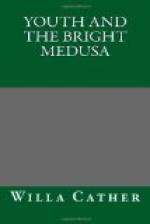Our visit to Bouchalka when he was ill had, of course, been reported, and the men about the Opera House had made of it the only story they have the wit to invent. They could no more change the pattern of that story than the spider could change the design of its web. But being, as she said, “in love” suggested to Cressida only one plan of action; to have the Tenth Street house done over, to put more money into her brothers’ business, send Horace to school, raise Poppas’ percentage, and then with a clear conscience be married in the Church of the Ascension. She went through this program with her usual thoroughness. She was married in June and sailed immediately with her husband. Poppas was to join them in Vienna in August, when she would begin to work again. From her letters I gathered that all was going well, even beyond her hopes.
When they returned in October, both Cressida and Blasius seemed changed for the better. She was perceptibly freshened and renewed. She attacked her work at once with more vigour and more ease; did not drive herself so relentlessly. A little carelessness became her wonderfully. Bouchalka was less gaunt, and much less flighty and perverse. His frank pleasure in the comfort and order of his wife’s establishment was ingratiating, even if it was a little amusing. Cressida had the sewing-room at the top of the house made over into a study for him. When I went up there to see him, I usually found him sitting before the fire or walking about with his hands in his coat pockets, admiring his new possessions. He explained the ingenious arrangement of his study to me a dozen times.
With Cressida’s friends and guests, Bouchalka assumed nothing for himself. His deportment amounted to a quiet, unobtrusive appreciation of her and of his good fortune. He was proud to owe his wife so much. Cressida’s Sunday afternoons were more popular than ever, since she herself had so much more heart for them. Bouchalka’s picturesque presence stimulated her graciousness and charm. One still found them conversing together as eagerly as in the days when they saw each other but seldom. Consequently their guests were never bored. We felt as if the Tenth Street house had a pleasant climate quite its own. In the spring, when the Metropolitan company went on tour, Cressida’s husband accompanied her, and afterward they again sailed for Genoa.
During the second winter people began to say that Bouchalka was becoming too thoroughly domesticated, and that since he was growing heavier in body he was less attractive. I noticed his increasing reluctance to stir abroad. Nobody could say that he was “wild” now. He seemed to dread leaving the house, even for an evening. Why should he go out, he said, when he had everything he wanted at home? He published very little. One was given to understand that he was writing an opera. He lived in the Tenth Street house like a tropical plant under glass. Nowhere in New York could




